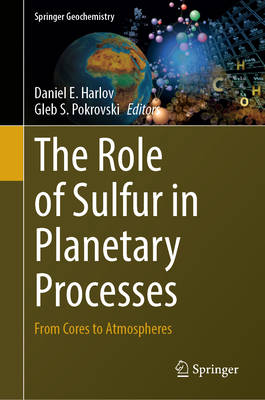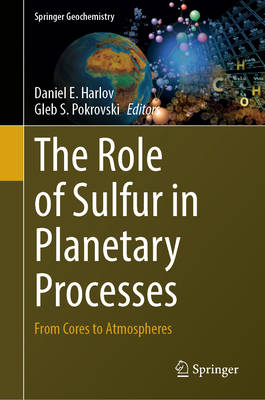
- Retrait gratuit dans votre magasin Club
- 7.000.000 titres dans notre catalogue
- Payer en toute sécurité
- Toujours un magasin près de chez vous
- Retrait gratuit dans votre magasin Club
- 7.000.0000 titres dans notre catalogue
- Payer en toute sécurité
- Toujours un magasin près de chez vous
The Role of Sulfur in Planetary Processes
From Cores to Atmospheres
Description
This book compiles a compendium of the current knowledge on the distribution, speciation and behavior of sulfur in the atmosphere, surface, crust, mantle, and core of the Earth as well as the other bodies of the solar system, including the terrestrial planets, dwarf planets, asteroids, moons, and the gas giants. It brings together a diverse group of geoscientists with broad interests, knowledge, and expertise regarding the behavior of sulfur in a variety of natural processes. This diversity of knowledge and experience allowed them to contribute to a comprehensive and coherent series of review chapters, which outline and expand upon the basis of our current understanding regarding how sulfur contributes to the origin, evolution, and functioning of the Earth as well as the other bodies of the solar system.
With a plethora of oxidation states (from -2 to +6), a cosmic element abundance rank of ten, a fascinating redox-, pH-, and radical-dependent chemistry, a strong chemical affinity for many metals, and a large fractionation among its four stable isotopes, sulfur is a key player and a powerful tracer element in the various physical and chemical processes occurring in the atmosphere, surface, crust, mantle, and core of the Earth as well as in the other bodies of the solar system. On Earth, as a key component of aqueous fluids, sulfur is a powerful complexing agent for a series of metals, which allows for their transfer across the lithosphere and subsequent concentration as ore deposits. As sulfur dioxide and sulfate, sulfur can act as an oxidizing agent, whereas as hydrogen sulfide and polysulfides, it can act as a reducing agent and a strong binder for metals, over a wide range of pressures and temperatures in the crust, upper mantle, and during subduction processes. Sulfur controls the partitioning of a many metals between silicate melts, gaseous and aqueous fluids, and mineral phases, thereby playing a major role in the formation of magmatic-hydrothermal and metamorphic ore deposits that supply strategic metal resources to our society. In the atmospheres of both the terrestrial worlds and the gas giants, sulfur plays a diverse and important role shaping their physical, chemical and biological evolution.
Spécifications
Parties prenantes
- Editeur:
Contenu
- Nombre de pages :
- 1180
- Langue:
- Anglais
- Collection :
Caractéristiques
- EAN:
- 9783032077042
- Date de parution :
- 21-12-25
- Format:
- Livre relié
- Dimensions :
- 155 mm x 235 mm

Les avis
Nous publions uniquement les avis qui respectent les conditions requises. Consultez nos conditions pour les avis.





